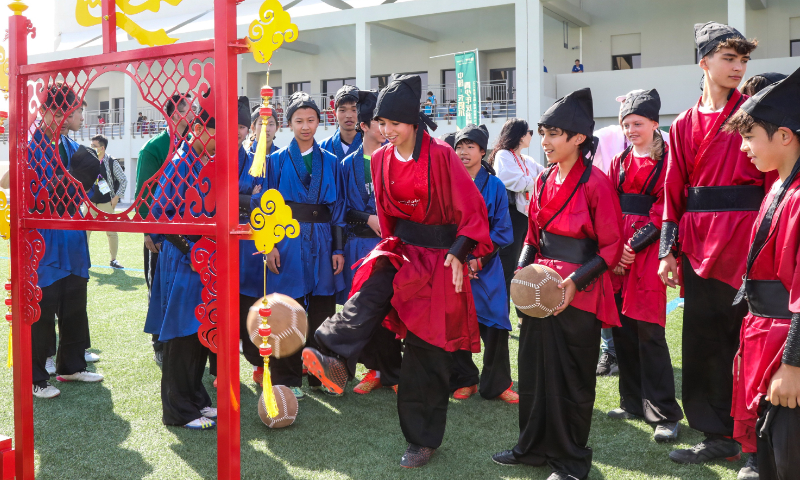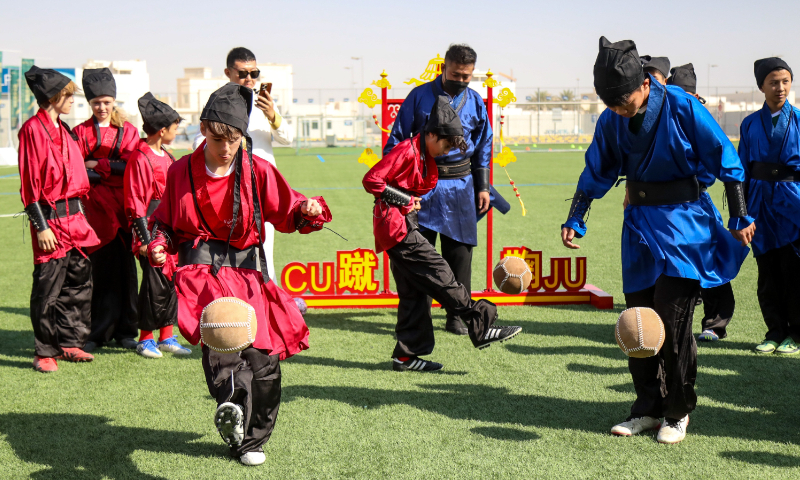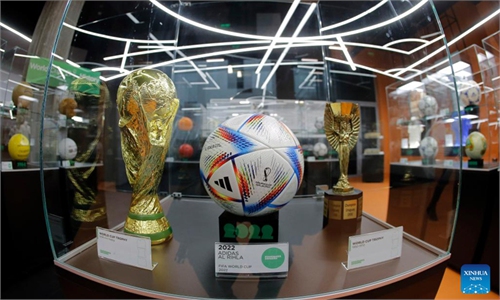SPORT / SOCCER
Soccer games held between Chinese, Qatari teenagers in Doha to enhance understanding

China-Qatar Youth Soccer Exchange and Experience Activity is held at the FIFA Fan Festival inside Al Bidda Park in Doha, Qatar on November 21, 2022, where young players are seen wearing traditional cuju clothes. Photo: Courtesy of Network of International Cultural-link Entities
A China-Qatar Youth Soccer Exchange and Experience Activity was held at the FIFA Fan Festival inside Al Bidda Park in Doha, Qatar on Monday morning, to enhance the friendship between the two countries as well as introducing the origin of soccer sport - the cuju game that originated in China.
"We hope that this event can promote cultural exchanges and mutual learning between China and Qatar. Both countries have a long history and profound cultural heritage. Cultural exchanges are a bridge between the two peoples and a source of vitality for the development of bilateral relations. And the exchange will be an opportunity to attract more Qatari people to understand Chinese culture," Zhou Jian, Chinese ambassador to Qatar, said in the speech.
"Youth is the foundation of football and the future of sports. And we hope that young soccer players of China and Qatar will carry forward the spirit of unity and learn from each other," Zhou added.
China and Qatar will cooperate during the World Cup to launch various soccer-related events in both countries, and at the same time taking the chance to look at the roots of the game in Zibo, an ancient town in East China's Shandong Province.
A series of international online and offline events has been launched in both Zibo and Qatar's capital city Doha, the culture and tourism department of the Shandong government announced last week.
In addition to the youth soccer match, other activities include exhibitions of soccer history in China, known as cuju in ancient times, as well as exchanges among young soccer players from China and Qatar.
To better introduce cuju, traditional performances have also been seen during the activity.
Li Weipeng, a seventh-generation inheritor of the cuju game in China, presented a performance in the park, demonstrating the tricks and skills of the ancient cuju competition.
The young players from China and Qatar also changed into traditional Chinese cuju costumes and experienced the difference between traditional cuju and the modern soccer game.

Photo: Courtesy of Network of International Cultural-link Entities
In addition, a photo exhibition of cuju culture was also displayed at the site, introducing the history of the ancient sport.
In 2004, FIFA recognized cuju as the prototype of the world's modern soccer game, with the city of Zibo as the birthplace.
As a sport as well as an art, cuju has served as a relic of ancient China which has been listed among the first batch of national intangible cultural heritage. From the Stratagems of the Warring States to the Records of the Grand Historian, cuju events repeatedly appear in historic records in China.
Jointly held by The Department of Culture and Tourism of Shandong Province, China's embassy in Qatar and other institutions, the event will also include the release of documentaries in both countries looking at the origins of soccer.
As the countdown to the World Cup proceeds, elements from China can be seen in every corner around Doha, from the main stadium of the World Cup to the recent arrival of giant pandas in the Middle East and sponsorship from Chinese companies.
On November 9, The Qatar Central Bank launched a special edition commemorative banknote for the 2022 World Cup, featuring the Lusail Stadium constructed by China Railway Group.
The stadium, located 15 kilometers north of Doha, has a capacity of 92,000, and it will hold the opening and closing ceremonies.
In addition, Chinese referees including Ma Ning, Shi Xiang and Cao Yi have also been included in the World Cup referee list.
"We hope that the communication events between Zibo and Doha can add more on top of the shining Chinese elements during the World Cup," noted the Shandong culture and tourism department in the announcement.
Global Times


